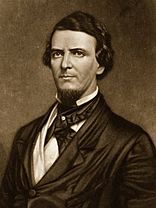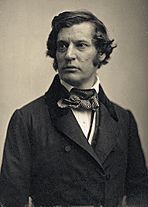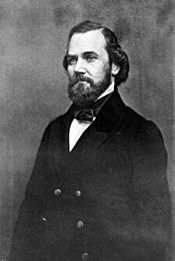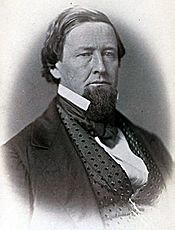Caning of Charles Sumner facts for kids
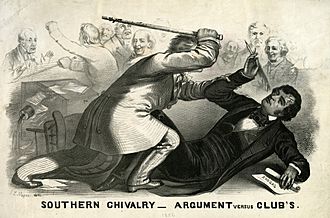
A political cartoon showing Sumner on the floor, with Preston Brooks standing over him with a cane.
|
|
| Date | May 22, 1856 |
|---|---|
| Venue | United States Senate chamber, United States Capitol |
| Location | Washington, D.C. |
| Type | Assault |
| Cause | Anti-slavery speech by Sumner |
| Target | Charles Sumner |
| Participants | Preston Brooks, Laurence M. Keitt, Henry A. Edmundson |
| Sentence | Brooks fined $300 ($9,770 in today's dollars) |
The Caning of Charles Sumner, also known as the Brooks–Sumner Affair, happened on May 22, 1856. It took place in the United States Senate chamber. Representative Preston Brooks from South Carolina, who supported slavery, used a walking cane to attack Senator Charles Sumner from Massachusetts. Sumner was an abolitionist, meaning he was against slavery.
Brooks attacked Sumner because of a speech Sumner gave two days earlier. In his speech, Sumner strongly criticized people who owned slaves, including Senator Andrew Butler of South Carolina, who was Brooks's relative. The attack seriously hurt Sumner. It also made the country even more divided over slavery. Many people saw this event as a sign that disagreements were turning violent, which eventually led to the Civil War.
Even though Sumner could not return to the Senate until December 1859, the state of Massachusetts chose not to replace him. His empty desk in the Senate served as a constant reminder of the attack.
Why It Happened
In 1856, there was a lot of fighting in Kansas over whether it would become a free state or a slave state. This time was known as "Bleeding Kansas". During this period, Senator Sumner gave a long speech called "Crime against Kansas" on May 19 and 20. In his speech, he argued that Kansas should immediately become a free state. He also spoke out against the "Slave Power", which was the political influence of slave owners.
Sumner then criticized the politicians who created the Kansas–Nebraska Act. This act allowed people in new territories to decide if they wanted slavery, which often led to violence. He specifically attacked Senator Andrew Butler of South Carolina. Sumner said that Butler treated slavery like a beloved partner, even though it was wrong. He also suggested that Butler made many mistakes when he spoke.
Before this, Sumner had been made fun of by other politicians, including Butler, for his strong opposition to slavery laws.
Representative Preston Brooks, who was Senator Butler's cousin, was very angry about Sumner's speech. He first thought about challenging Sumner to a duel, which was a formal fight to defend one's honor. However, his friend, Representative Laurence M. Keitt, told him that Sumner was not a "gentleman" because of his harsh words. So, Brooks decided that instead of a duel, he would publicly humiliate Sumner by beating him with a cane.
The Attack
Two days later, on the afternoon of May 22, 1856, Brooks went into the Senate chamber. He was with Keitt and another ally, Representative Henry A. Edmundson of Virginia. They waited for the public viewing areas to clear, especially making sure no women were present. Brooks then approached Sumner, who was sitting at his desk writing in the almost empty chamber.
Brooks spoke calmly, saying, "Mr. Sumner, I have read your speech twice over carefully. It is a libel on South Carolina, and Mr. Butler, who is a relative of mine." As Sumner began to stand up, Brooks started hitting him hard on the head with a thick cane that had a gold handle. The blows were so powerful that Sumner immediately lost his sight. He later remembered acting only on instinct to defend himself.
Sumner was knocked down and stuck under his heavy desk, which was bolted to the floor. Brooks kept hitting Sumner until Sumner managed to pull the desk from the floor to try and escape. By this time, Sumner was bleeding and couldn't see. He stumbled up the aisle, trying to defend himself with outstretched arms. But he was an easy target for Brooks, who continued to beat him on his head, face, and shoulders. Brooks didn't stop even when his cane broke; he kept hitting Sumner with the part that still had the gold handle. Sumner collapsed unconscious.
Several other Senators and Representatives tried to help Sumner. But they were blocked by Edmundson, who yelled at them to stay away. Keitt also stopped them, waving his own cane and a pistol, shouting, "Let them be!"
Senator John J. Crittenden tried to intervene and begged Brooks not to kill Sumner. Senator Robert Toombs then stepped in for Crittenden.
Finally, Representatives Ambrose S. Murray and Edwin B. Morgan were able to stop Brooks. Brooks then quietly left the chamber. Sumner slowly regained consciousness and was helped to a cloakroom. He received first aid and stitches. With help, Sumner was taken by carriage to his home for more medical care. Brooks also needed medical attention because he had accidentally hit himself above his right eye during the attack.
The cane Brooks used broke into several pieces. Some pieces, including the gold handle, were collected by Edmundson. The part with the gold handle is now on display at the Old State House Museum in Boston. Southern lawmakers made rings out of other pieces of the cane. They wore these rings to show their support for Brooks.
What Happened Next
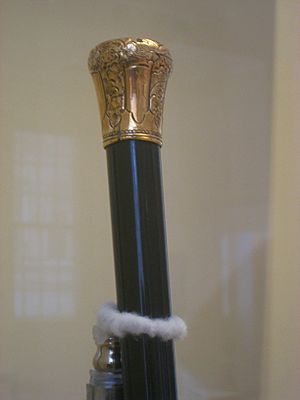
This event showed how divided America was becoming. Sumner became a hero in the North, while Brooks became a hero in the South. People in the North were very angry. Newspapers said that the South would not allow free speech and would use violence to stop it. They asked if Northerners were now slaves, to be beaten if they didn't please Southerners. Thousands of people attended rallies to support Sumner in many Northern cities. Over a million copies of Sumner's speech were shared.
On the other hand, Southern newspapers praised Brooks. Some even said Sumner should be beaten "every morning." They called the attack "good" and said that abolitionists needed to be "lashed into submission." Southerners sent Brooks hundreds of new canes to show their support. One cane even had "Hit him again" carved into it.
Representative Anson Burlingame from Massachusetts challenged Brooks to a duel. Burlingame was a very good shot and chose rifles as the weapon. He also picked a dueling spot in Canada, where U.S. laws against dueling wouldn't apply. Brooks backed out, saying he didn't want to risk traveling through Northern states to get there.
Senator Henry Wilson, Sumner's colleague from Massachusetts, called the beating "brutal, murderous, and cowardly." Brooks challenged Wilson to a duel too, but Wilson refused. He said he couldn't participate because it was against the law and his personal beliefs. Wilson continued his Senate duties, and Brooks did not attack him.
Historians believe that Brooks's attack was very important in helping the new Republican Party become a major political force.
Southerners often made fun of Sumner, saying he was faking his injuries. They claimed the cane wasn't heavy enough to cause serious harm. However, Sumner actually suffered serious head injuries that caused him constant pain for the rest of his life. He had symptoms similar to what we now call a traumatic brain injury and posttraumatic stress disorder. He spent three years recovering before he could return to his Senate seat. Massachusetts deliberately did not replace him, leaving his desk empty as a reminder. The state even reelected him in 1857, even though he couldn't take his seat.
Brooks said he didn't mean to kill Sumner. He was arrested for the assault. He was found guilty and fined $300 (which is a lot of money today), but he did not go to prison. There was an attempt to remove Brooks from the House of Representatives, but it failed. He resigned on July 15 to let his voters decide if they approved of his actions. They did approve; Brooks was quickly re-elected in August and again for a new term later in 1856. However, he died of an illness called croup before his new term began.
Keitt was officially criticized by the House. He resigned in protest, but his voters also re-elected him very quickly.
In the 1856 elections, the new Republican Party gained support by talking about "Bleeding Kansas" and "Bleeding Sumner." Both events made pro-slavery Democrats look extreme. Even though Democrats won the presidential election, Republicans gained many seats in state legislatures. This helped them gain seats in the U.S. Senate, because senators were chosen by state legislatures back then. The violence in Kansas and the attack on Sumner helped the Republican Party grow stronger. This set the stage for their victory in the 1860 presidential election.
During a later session of Congress in 1856, Brooks gave a speech. In it, he said Kansas should be allowed to join the United States "even with a constitution rejecting slavery." His calmer tone surprised Northerners and disappointed those who supported slavery.
Images for kids
 | Dorothy Vaughan |
 | Charles Henry Turner |
 | Hildrus Poindexter |
 | Henry Cecil McBay |


